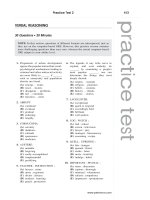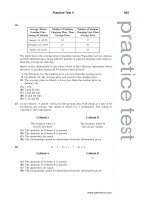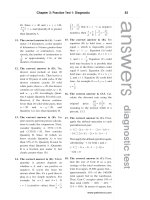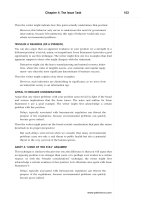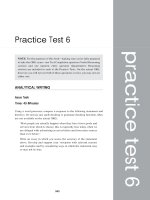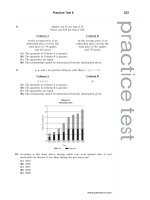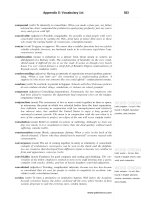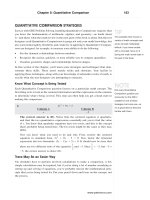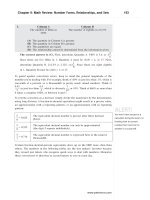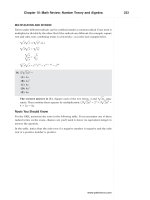Master in International Relations Subject Description pdf
Bạn đang xem bản rút gọn của tài liệu. Xem và tải ngay bản đầy đủ của tài liệu tại đây (235.61 KB, 4 trang )
Master in International Relations
Subject Description
Master in International Relations. Subject Description2
SKILLS, COMPETENCIES AND LANGUAGES
Quantitative Methods
• Quantitative analyses in political economy
• Graphical presentation of data, sampling methods, rules of probability, statistical inference, hypothesis tests, simple and
multiple linear regressions, correlation, and other relevant econometric tools
Spanish
A Spanish language course will be mandatory for students who are not professionally procient in Spanish
French
Students who are procient in Spanish will be required to take a French language course
The program comprises the following 21 core courses (subject to minor changes):
EUROPEAN INSTITUTIONS AND SECURITY STUDIES
The European Union
• EU institutions and decision-making processes
• Treaty reforms, including the failed European Constitution and the Treaty of Lisbon
• Core EU policies: internal market, economic and monetary union, external trade, foreign and security policy, enlargement
Theories in International Relations
International Environmental Policy
Euro-American Relations
• Institutional structure and common security concerns
• The relationship between the North Atlantic Treaty Organization and the European Union
• EU and NATO peacekeeping operations
Globalized Terrorism: Threats and Responses
• Actors in the global terrorism network
• Scenarios of the global terrorism threat
• Evolving trends and western responses to global terrorism
• Responses from the international community
• Perspectives on terrorism and counterterrorism
The European Union: Advanced Topics
• Balance of power between the Commission and the European Parliament
• Commitology and its reform
• The EU and political regions
• Rethinking economic and monetary union
• Justice and home aairs in the EU
• The road towards European defense
• Fundamental rights in the EU
• European external action service
• EU communication policy
Master in International Relations. Subject Description3
SOCIAL SCIENCES AND HUMANITIES
Negotiation
• Approach to the concept of negotiation. The
negotiator’s dilemma
• Preparing for negotiations, Claiming value, Negotiating
interests
• Creating Value
• Multilateral-multiatribute negotiations
• Fair agreements and deviation from rational behavior
Comparative Politics
• Polities, policies, and politics
• States, regimes, and institutions
• Citizens, parties, and party systems
• Elections and Electoral systems
• Governance and performance
History of International Relations
• The making of the European system of states
• Colonialism and imperialism
• The rise of non-European powers
• World Wars and the Cold War, globalization
Game Theory and Conict Resolution
Fundamentals of rational-choice and game theories
applied to international decision-making and to the
choice of public policies by states
Challenges to Democracy in Latin America
• Analysis of recent political events in the region
• Overview of main historical tendencies that inuence
political processes in the region
• General trends, but also diversity and dierences
within the region
• Analysis of the main challenges facing democratic
governments
New Strategic Players in the 21
st
century:
China and India
• The growing “weight” of the two states in international
decision-making
• Role in world markets
• Concerns of other actors with the appearance of
Beijing and New Delhi as new brokers in the evolving
international system
Understanding contemporary China:
Chinese culture and society
• Introduction. China and its people
• Chinese Language
• The Chinese classics
• Confucianism and democratization
• The Literary Revolution, Maoism and Revolution.
Literature, Internet and political control in
contemporary China
• The Maoist era
• The Value of Culture when Negotiating in China
• Communism, Nationalism and Economic Patriotism
• Intellectuals and Power in China: The 20
th
anniversary
of the 1989 June 4
th
Massacre
Politics, Society and International Relations of the
Middle East
• Introduction to state-society relations in the Middle
East
• Political economy of the Middle East
• Roles of Middle Eastern countries in world politics
Master in International Relations. Subject Description4
During the electives period in June, students select
topics of special interest from a list of courses oered
in both the Master in International Relations and the
Law programs.
All students will also be required to write a master’s
thesis.
The program’s academic curriculum will be further
enriched by a series of seminars during which
international experts from politics, business and
civil society will share their privileged insights and
experiences with program participants.
ECONOMICS AND BUSINESS
Micro and Macro Economics
• An introduction to the basic notions and models in
micro- and macro-economics
• Consumers and rms
• Demand, production, market structure and market
failure
• Growth, employment and the role of government
International Trade and the International Monetary
System.
• Theory of international trade and investment
• Trade policy measures
• International monetary theory
• The balance of payments and the trade balance
• Exchange rate systems
Economic Development Theory
• Patterns and causes of economic growth
• Development factors: population growth, research,
access to international nancial ows
• Main obstacles to economic development
• Economic development and natural resources
International Finance
Management of the Multinational Corporation
• Internationalization choices and processes
• Market selection
• Intellectual property protection
• Production delocalization
• Strategic alliances
IE School of International Relations
Tel: +34 91 568 96 10
www.ie.edu
ir.blogs.ie.edu
María de Molina 13
28006 Madrid, Spain
Master in International Relations
